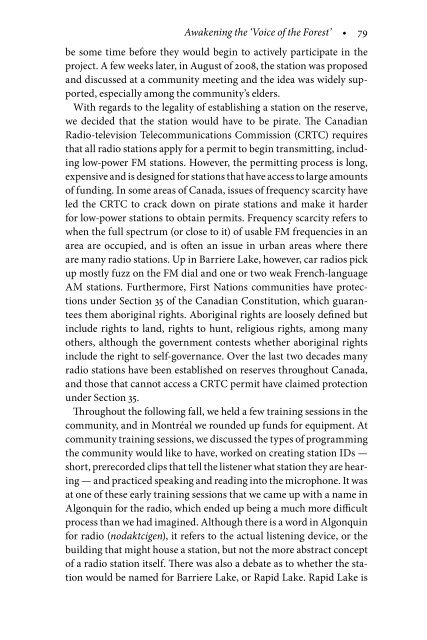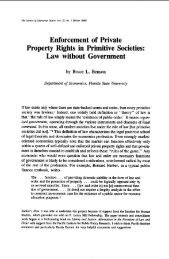Andrea Langlois et al - Islands of Resistance - Pirate Radio in Canada
Andrea Langlois et al - Islands of Resistance - Pirate Radio in Canada
Andrea Langlois et al - Islands of Resistance - Pirate Radio in Canada
You also want an ePaper? Increase the reach of your titles
YUMPU automatically turns print PDFs into web optimized ePapers that Google loves.
Awaken<strong>in</strong>g the ‘Voice <strong>of</strong> the Forest’ • 79<br />
be some time before they would beg<strong>in</strong> to actively participate <strong>in</strong> the<br />
project. A few weeks later, <strong>in</strong> August <strong>of</strong> 2008, the station was proposed<br />
and discussed at a community me<strong>et</strong><strong>in</strong>g and the idea was widely supported,<br />
especi<strong>al</strong>ly among the community’s elders.<br />
With regards to the leg<strong>al</strong>ity <strong>of</strong> establish<strong>in</strong>g a station on the reserve,<br />
we decided that the station would have to be pirate. The Canadian<br />
<strong>Radio</strong>-television Telecommunications Commission (CRTC) requires<br />
that <strong>al</strong>l radio stations apply for a permit to beg<strong>in</strong> transmitt<strong>in</strong>g, <strong>in</strong>clud<strong>in</strong>g<br />
low-power FM stations. However, the permitt<strong>in</strong>g process is long,<br />
expensive and is designed for stations that have access to large amounts<br />
<strong>of</strong> fund<strong>in</strong>g. In some areas <strong>of</strong> <strong>Canada</strong>, issues <strong>of</strong> frequency scarcity have<br />
led the CRTC to crack down on pirate stations and make it harder<br />
for low-power stations to obta<strong>in</strong> permits. Frequency scarcity refers to<br />
when the full spectrum (or close to it) <strong>of</strong> usable FM frequencies <strong>in</strong> an<br />
area are occupied, and is <strong>of</strong>ten an issue <strong>in</strong> urban areas where there<br />
are many radio stations. Up <strong>in</strong> Barriere Lake, however, car radios pick<br />
up mostly fuzz on the FM di<strong>al</strong> and one or two weak French-language<br />
AM stations. Furthermore, First Nations communities have protections<br />
under Section 35 <strong>of</strong> the Canadian Constitution, which guarantees<br />
them aborig<strong>in</strong><strong>al</strong> rights. Aborig<strong>in</strong><strong>al</strong> rights are loosely def<strong>in</strong>ed but<br />
<strong>in</strong>clude rights to land, rights to hunt, religious rights, among many<br />
others, <strong>al</strong>though the government contests wh<strong>et</strong>her aborig<strong>in</strong><strong>al</strong> rights<br />
<strong>in</strong>clude the right to self-governance. Over the last two decades many<br />
radio stations have been established on reserves throughout <strong>Canada</strong>,<br />
and those that cannot access a CRTC permit have claimed protection<br />
under Section 35.<br />
Throughout the follow<strong>in</strong>g f<strong>al</strong>l, we held a few tra<strong>in</strong><strong>in</strong>g sessions <strong>in</strong> the<br />
community, and <strong>in</strong> Montré<strong>al</strong> we rounded up funds for equipment. At<br />
community tra<strong>in</strong><strong>in</strong>g sessions, we discussed the types <strong>of</strong> programm<strong>in</strong>g<br />
the community would like to have, worked on creat<strong>in</strong>g station IDs —<br />
short, prerecorded clips that tell the listener what station they are hear<strong>in</strong>g<br />
— and practiced speak<strong>in</strong>g and read<strong>in</strong>g <strong>in</strong>to the microphone. It was<br />
at one <strong>of</strong> these early tra<strong>in</strong><strong>in</strong>g sessions that we came up with a name <strong>in</strong><br />
Algonqu<strong>in</strong> for the radio, which ended up be<strong>in</strong>g a much more difficult<br />
process than we had imag<strong>in</strong>ed. Although there is a word <strong>in</strong> Algonqu<strong>in</strong><br />
for radio (nodaktcigen), it refers to the actu<strong>al</strong> listen<strong>in</strong>g device, or the<br />
build<strong>in</strong>g that might house a station, but not the more abstract concept<br />
<strong>of</strong> a radio station itself. There was <strong>al</strong>so a debate as to wh<strong>et</strong>her the station<br />
would be named for Barriere Lake, or Rapid Lake. Rapid Lake is



